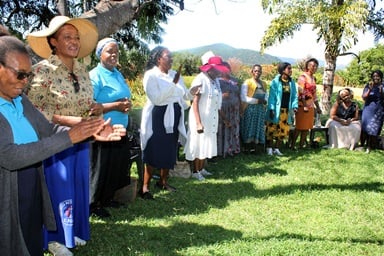In a conversation about civil rights and voter suppression, two African American women shared some pivotal experiences with participants at the I AM Her Women’s Leadership Summit.
Clara Ester grew up in Memphis under the Jim Crow law and was trained to be a community organizer in high school. She became actively involved in the civil rights movement through a United Methodist pastor, the Rev. James Lawson. They were involved in the Memphis sanitation strike, and the Rev. Martin Luther King Jr. came to offer his support.
Ester was at the Lorraine Motel on May 4, 1968, when an assassin’s bullet found King. “I watched him being lifted up and thrown back on that balcony area,” she recalled quietly. Then, somehow, she found herself standing over him. She unbuckled his belt and checked his pulse; his eyes were open. “He had a beautiful smile on his face.”
A deaconess who just finished her term as vice president of United Methodist Women, Ester has continued “to speak up and speak out around social issues that affect anyone who has been deprived of their human rights,” she said.
Her focus this fall is on people exercising their right to vote. “I pray to God that every protester, every concerned citizen, will take that vote to the polls.”
The Rev. Francine Thirus is a Chicago native whose parents moved there from Alabama as part of the Great Migration. A teacher, teacher’s union activist and lawyer before she became a pastor, she remembers the shock over the death of Emmett Till and the discrimination against Blacks in housing, education and employment.
In 1968, King’s death “knocked the wind out of our sails temporarily,” she said. “But we had to pull together. There was only one of him, but there were thousands and thousands and millions of us. It pushed us forward.”
The death of George Floyd in Minneapolis earlier this year provided the same jolt. “Just as we did before, we have to continue on to fight this battle,” Thirus said. “The most powerful tool we have right now is the vote.”
Like what you're reading? Support the ministry of UM News! Your support ensures the latest denominational news, dynamic stories and informative articles will continue to connect our global community. Make a tax-deductible donation at ResourceUMC.org/GiveUMCom.



